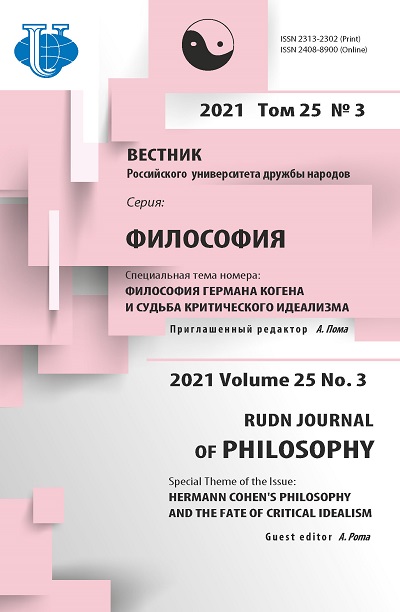Hermann Cohen and His Idea of the Logic of Pure Knowledge
- Authors: Sokuler Z.A.1
-
Affiliations:
- Lomonosov Moscow State University
- Issue: Vol 25, No 3 (2021): HERMANN COHEN'S PHILOSOPHY AND THE FATE OF CRITICAL IDEALISM
- Pages: 378-393
- Section: HERMANN COHEN'S PHILOSOPHY AND THE FATE OF CRITICAL IDEALISM
- URL: https://journals.rudn.ru/philosophy/article/view/27507
- DOI: https://doi.org/10.22363/2313-2302-2021-25-3-378-393
Cite item
Full Text
Abstract
Hermann Cohen, as it is well known, criticised the Kantian notion of the thing-in-itself. And before him the Kantian thing-in-itself was criticised by Fichte and other German idealists. Probably for this reason, Hermann Cohen is sometimes regarded as a person who said things similar to Fichte. This gives a completely wrong perspective, making it impossible to understand the philosopher's ideas. The basis for his critique of the Kantian thing-in-itself is quite different from the motives, determining the criticism of Kant in the classical German Idealism. Such interpretation does not allow to see close connection of Cohen's theoretical philosophy with revolution in physics which took place at the turn of the nineteenth and twentieth centuries. The article explains how Cohen's demand that pure thinking must form its own content is connected with transformations taking place in physics and mathematics, and the peculiarity of Cohen's understanding of idealism is demonstrated: for him, correct idealism must realize that autonomous, free thinking should work seriously with sense data. The closeness of Cohen's ideas to the postpositivist thesis of the theory-ladenness of observation is explained. For Cohen, serious work with sense data is opposite to uncritical acceptance of them as given. The origin of scientific thinking is thinking itself. It responds to the challenge of sensory material by creating its own constructs. Mathematized natural science becomes for Cohen both an example and a confirmation of this thesis. For him, what is real is what is described in the language of mathematical analysis, i.e. continuous processes, in spite of the fact that any data are discrete. It is shown that the source of Cohen's assertions on this issue is in Kant's Critique of Pure Reason, namely in the doctrine of the Principles of pure natural science and, more specifically, in the Anticipations of Perception. Cohen's conviction of the constructive character of the theories of mathematized natural science is confirmed in the article by references to the authority of A. Einstein.
About the authors
Zinaida A. Sokuler
Lomonosov Moscow State University
Author for correspondence.
Email: zasokuler@mail.ru
Doctor of Philosophy, Professor, Chair of Ontology and Theory of Knowledge
27-4, Lomonosovsky Prospekt, GSP-1, Moscow, 119991, Russian FederationReferences
- Belov VN. Predislovie k perevodu “Teorii opyta Kanta” [Foreword to the translation of “Kant’s Theory of Experience”]. In: Cohen H. Kant's Theory of Experience. Moscow: Akademicheskii proekt Publ.; 2012. P. 5—69. (In Russian).
- Yakovenko BV. On Theoretical Philosophy of Hermann Cohen. In: Yakovenko BV. Moshh filosofii [The Power of Philosophy]. Saint-Petersburg: Nauka publ.; 2000. P. 424—472. (In Russian).
- Cassirer E. Hermann Cohen, 1842—1918. Social Research. 1943;10(2):219—232.
- Cohen H. Kant's Theory of Experience. Moscow: Akademicheskii proekt Publ.; 2012. (In Russian).
- Gaidenko PP. Scientific rationality and philosophical mind. Moscow: Progress-Tradition; 2003. (In Russian).
- Dlugatch TB. O nekotorykh printsipakh teoreticheskoi filosofii Germana Kogena [On some principles of theoretical philosophy of Hermann Cohen]. In: Istoriko-filosofskiy ezhegodnik [History of Philosophy Yearbook]. Moscow: Nauka Publ.; 2006. P. 180—203. (In Russian).
- Patton L. Hermann Cohen's History and Philosophy of Science. [A thesis submitted to McGill University in partial fulfilment of the requirements of the degree of Ph.D.]. McGill University; 2004. Available from: https://www.researchgate.net/publication/277695700_ Hermann_Cohen's_History_and_Philosophy_of_Science.
- Cohen H. Logik der reinen Erkenntnis. Dritte Aufl. Berlin: B. Cassirer; 1922.
- Beiser FrC. Hermann Cohen. An Intellectual Biography. Oxford: Oxford University Press; 2018.
- Bachelard G. Novyi ratsionalizm [The New Rationalism]. Moscow: Progress Publ.; 1987. (In Russian).
- Cohen H. Religion der Vernunf aus den Quellen des Judentums. Frankfurt am Main: J. Kauffmann Verlag; 1929.
- Koyré A. Ocherki istorii filosofskoi mysli [Studies of the History of Philosophical Thought]. Moscow: Progress Publ.; 1985. (In Russian).
- Holton G. Tematicheskii analiz nauki [Thematical Analysis of Science]. Moscow: Progress Publ.; 1981. (In Russian).
- Einstein A. Collected scientific works, in 4 vols. Vol. 4. Moscow: Nauka Publ.; 1967. (In Russian).
- Kant I. Prolegomeni ko vsjakoj buduschej metafisike, moguschej pojavitsja kak nauka [Prolegomena to any future metaphysics that may appear as a science] // Kant I. Collected works, in 6 vols. Vol. 4 (1). Moscow: Mysl’ Publ.; 1965. P. 67—210. (In Russian).
- Kant I. Critique of Pure Reason. Moscow: Nauka Publ.; 1998. (In Russian).
- Cohen H. Das Princip der Infinitesimal-Methode und seine Geschichte. Berlin: Dümmler; 1883.
- Cohen H. Principle of the Infinitesimal Method. Epistemology and Philosophy of Science. 2010;26(4):223—229. (In Russian).
- Belov VN. The Method of the Infinitesimal as the Principle of the Theory of Knowledge in Systematic Constructions of H. Cohen. Voprosy Filosofii. 2018;(3):68—74. (In Russian).
- Secundant S. Theory of infinitesimal and its role in the development of G. Cohen's philosophical and methodological concept. Epistemology and Philosophy of Science. 2010;26(4):219—222. (In Russian).
















